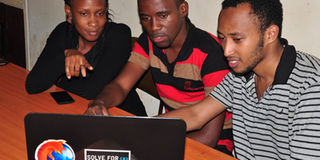MAKERERE STUDENTS DEVELOP APP THAT DETECTS PNEUMONIA

Mama-Ope innovators, Olivia Koburongo, Brian Turyabagye and Besufekad Shifferaw. Photo by Alex Esagala
Pneumonia is a killer disease that claims hundreds of lives in Uganda every year. To counter the disease, students of Makerere University have come up with an app, Mama-Ope, that will help diagnose the disease earlier in young children. Mama-Ope is an innovation that was born out of an entry of Mak students in the Big Ideas Innovations competition.
This global online competition was organised by University of California, Berkeley with support from USAID, Charles Schwab Foundation and Blum Centre for Innovations.
The competition provided funds, support and encouragement to interdisciplinary teams of students with big ideas from universities all over the world to compete against each other.
Winning team
The two groups from Makerere University were the only representatives from Africa, competing against more than 2,000 teams.
The group, which developed Mama-Ope, emerged runner-up in the Health category and won a cash prize of $6,500 (Shs21m) to further develop their prototype.
The Mama-Ope team members include; Olivia Koburongo, Brian Turyabagye (Telecommunication Engineering), Besufekad Shifferaw (Computer Engineering), Viola Akangumya (Social Sciences) and Angella Namwase (Nursing and Midwifery).
The final year students, who were encouraged to participate by their mentor Cosmas Mwikirize, a PhD Biomedical Engineering scholar at the State University of New Jersey, have been part of Ilabs at Mak since their second year. It has nurtured them as young innovators.
“I was inspired to innovate something for pneumonia patients because my grandmother died of the disease last year in June. There was only one monitoring screen in her ward which was inaccessible to the rest of the patients who could not afford to pay for it,” narrates Koburongo.
The group says the aim of this app is to give hope to children below five years since pneumonia affects the very young and the very old.
“We want to save them 86 years ahead,” interjects Turyabagye. We wanted to find a device that could distinguish pneumonia from other diseases.
How the app works
Mama-Ope is a pneumonia kit for diagnosis in young children. This kit will use mobile phones for interpreting results faster than an ordinary stethoscope. It will be used to diagnose pneumonia at its early or screening stage.
It is also expected to help in continuous monitoring of patients. The kit contains a thermometer for checking body temperature and a flex-sensor to check breathing rates.
Mama-Ope works by collecting information from the patient and sending it to the smartphone for interpretation within two minutes.
A red light indicates that an individual is likely to have pneumonia.
“The advantage of using the phone is that it gives longer storage to the patient’s results compared to the current devices being used,” Besufekad says. Also, the results will come out in the simplest form which can be interpreted by the medical personnel.
Using Mama-Ope is set to be more time-saving in that it will give results within two minutes as opposed to the five or more minutes that a stethoscope may require.
This group of students intend to make long-term adjustments where long distance monitoring of patients is possible by their doctors.
Using this tele-medicine approach, the device will auto-send messages to personal doctors and provide easy statistics on areas affected by pneumonia in Uganda.
The team hopes to reach affected communities within Uganda before spreading across Africa through ministries of health and other organisations. The group is working with Resilient Africa Network (RAN). They expect to have a prototype for testing in January 2016.




